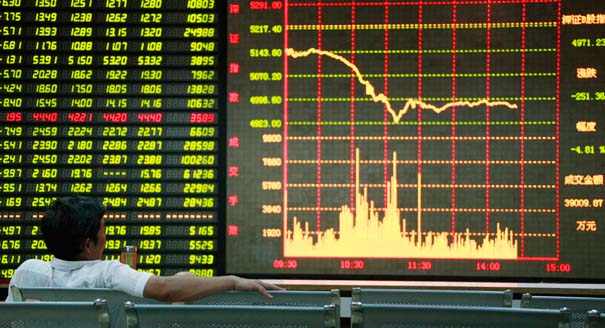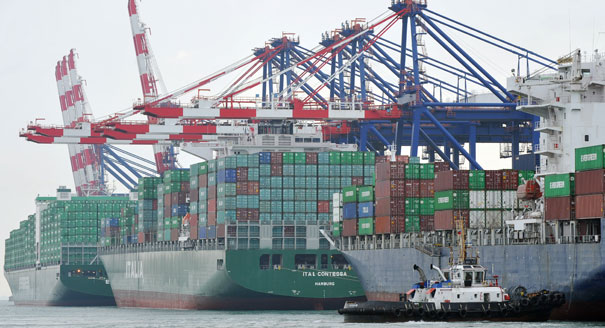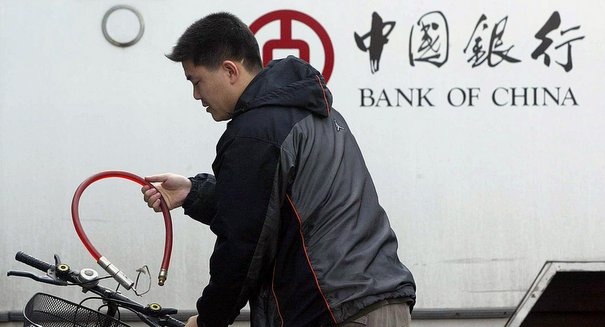Michael Pettis
{
"authors": [
"Michael Pettis"
],
"type": "commentary",
"blog": "China Financial Markets",
"centerAffiliationAll": "",
"centers": [
"Carnegie Endowment for International Peace"
],
"englishNewsletterAll": "",
"nonEnglishNewsletterAll": "",
"primaryCenter": "Carnegie Endowment for International Peace",
"programAffiliation": "",
"programs": [],
"projects": [],
"regions": [
"China"
],
"topics": [
"Economy"
]
}
Source: Getty
Will Beijing Raise Interest Rates to Combat Inflation?
China's interest rate hikes are primarily intended to rebalance China's overheated investment sector, but they will likely have little effect on the country's rising inflation.
The big concern in China now is rising inflation. The market is obsessed with fears over what steps Beijing will or will not take to combat rising prices. Beijing has already hiked interest rates, raised reserve requirements, imposed price freezes, and is reportedly going to tough out the existing lending quotas. Beijing may even throw in the towel and declare a “new normal.” According to an article in Wednesday’s South China Morning Post:
Beijing is likely to raise next year’s official inflation target and tighten monetary policy, state media said Wednesday, amid expectations for consumer prices to continue rising.
The Central Economic Work Conference, which is expected to meet next month, will probably hike the government’s annual inflation target to 4.0 per cent from 3.0 per cent this year, the China Business News said, citing an unnamed source. The conference is the most important economic policy making event of the year and gathers top Chinese leaders, usually including President Hu Jintao and Premier Wen Jiabao.
As I mentioned in an entry last month, it was going to be very hard for the banks to stay within this year’s RMB 7.5 trillion quota, and there was a real question about whether or not the regulators were going to enforce the quota. On Tuesday evening the PBoC even announced that it was going to face challenges in controlling the lending pace for the rest of the year. Separately, Tuesday’s Bloomberg had an interesting article on the subject:
China’s biggest banks are close to reaching annual lending quotas and plan to stop expanding their loan books to avoid exceeding the limits, according to four people with knowledge of the matter. Industrial & Commercial Bank of China Ltd., Bank of China Ltd. and Agricultural Bank of China Ltd. are only extending new loans as existing ones get repaid, the people said, speaking on condition of anonymity. Lenders are also cutting holdings of discounted bills to make room for longer-term debt, they said.
Tuesday’s People’s Daily is suggesting that next year’s loan quota will be below this year’s:
Financial institutions forecast that the new bank loan scale will reach between 6 trillion yuan and 7 trillion yuan in 2011. Although the figure is lower than the 7.5 trillion yuan of new bank loans for 2010, its upper limit will possibly reach 7 trillion yuan. This is mainly associated with the loans to be allocated to reserve projects.
I am very skeptical that they will be able to reduce the loan quota next year, especially if trade tensions worsen, which I expect, but I did notice that there was sort of an “out’ in the PD article:
Furthermore, a certain amount of new loans should be extended in order to ensure continued economic growth and structural adjustments in 2011.
On the subject of interest rates there was also this article in Bloomberg about concerns that interest rates would rise:
China’s benchmark money-market rate rose to the highest level in almost seven weeks on speculation policy makers will lift borrowing costs again after raising lenders’ reserve requirements last week to tame inflation.
China’s central bank adviser Xia Bin said the nation should further tighten monetary policy next year due to the pressure of excessive liquidity at home and abroad, the Shanghai-based Oriental Morning Post newspaper reported yesterday. The People’s Bank of China said Nov. 19 it would lift the amount of cash banks must set aside as reserves by 50 basis points from Nov. 29. A press official at the central bank, who refused to be identified, declined to comment.
“Future rate hikes and inflation-curbing measures are now more adequately priced in but the bias for higher rates will remain until the next rate hike materializes,” said Delphine Arrighi, a Hong Kong-based strategist at Standard Chartered Plc. “We still see another 25 basis point interest-rate increase by the end of this year, and another three increases, all of 25 basis points, within the first half of next year,” she said.
Last month I said I doubted Beijing’s resolve to hold firm on the loan quotas, just as I doubted we would see much action on the interest-rate front, but it seems increasingly likely that the hawks are going to win this argument. So are interest rates really rising, and if so will it matter?
The answer to the first question is: No. Inflation this year is rising much faster than interest rates, which have only managed a 25 basis-point hike. It will take at least 200-300 basis points, probably a lot more, just to bring real deposit rates back to where they were earlier in the year.
As for the second question, I am not sure raising rates will reduce inflation at all. On the contrary, in China they may actually increase inflation. I know this is going to seem pretty controversial – how can raising rates make inflation worse?
Bear with me. In the US, I think, most of us agree that raising interest rates is anti-inflationary, but why? I would argue that it reduces inflationary pressures primarily through three channels. First, raising interest rates makes it more expensive for consumers to borrow money to finance purchases.
Second, because most Americans save in the form of stocks, bonds, and real estate, rather than bank deposits, higher rates are associated with declining asset prices, and so Americans feel poorer. This (the “wealth effect”) causes them to reduce their consumption. Finally, raising rates reduces investment and so raises unemployment, further reducing consumption by increasing uncertainty and lowering household income.
In other words raising interest rates in the US puts downward pressure on prices by reducing demand. But will raising interest rates reduce demand in China?
I am not at all sure it will. Take the first of the three effects. Excluding mortgages (whose pricing reflects other concerns) there is very little consumer financing in China, so increasing its cost is not likely to have much effect. You might argue that it will affect demand for automobiles, where there is some financing, but this is a small part of the consumer basket and most of the inflationary pressure is anyway on food prices.
What about the wealth effect? Here raising rates may actually be counterproductive. The vast bulk of Chinese savings is in the form of bank deposits, and China’s artificially low interest rates are effectively a major hidden tax on household income, as I have argued many times before. In this case raising the deposit rate is like reducing taxes, and this is hardly likely to reduce demand. On the contrary, by raising disposable household income it will actually raise household consumption, although this may take several months before it is significant.
Finally what about the effect on investment and employment – will raising rates cause unemployment to rise? Maybe, but with real lending rates so low, perhaps even negative, and with the credit risk on much of the lending effectively socialized, the mechanism by which interest rates regulate lending does not work in China they way it does in the US. What limits credit growth in China is primarily the new lending quota, not interest rates, and perhaps not even reserve requirements. Interest rates themselves are likely to have little impact on the amount of lending – at least in the formal banking system, but in the informal banks, where there is no financial repression, it might. Anyway, I am very skeptical that the State Council will let rates rise enough to let rising unemployment bring down demand.
In a funny way, then, rising inflation creates its own resolution in a financial system that is severely repressed. As inflation rises, real interest rates decline. This reduces real household income and so reduces demand. It also reduces the real borrowing cost for manufacturers, and so supply rises. In my opinion this is the main reason why countries with severely repressed financial systems can accommodate rapid monetary growth and low inflation, as China has for most of the past two decades.
This doesn’t necessarily mean that inflation won’t be a problem in China next year. Many things affect inflation besides the monetary response. My point is not that thanks to financial repression China can never experience inflation, it is merely that raising interest rates might not be nearly as effective in combating inflation as we might otherwise think and may even be counterproductive.
My former student and Shenyin Wanguo associate, Chen Long, after he saw the early version of this piece made a strong counter-argument that one of the consequences of inflation and negative real deposit rates is that households are reducing deposits and rushing to anticipate consumption – i.e. buying stuff now that they don’t really need as a store of wealth. This drives up consumption today, albeit at the expense of consumption tomorrow, and in that sense it may add inflationary pressure. Hiking interest rates, Chen Long pointed out, may reduce the incentive to do so. He is right, of course, but it is not clear that this effect outweighs the wealth effect.
While financially repressed systems are very good at combating inflation, this comes with a cost – overinvestment and low household consumption. Already we are seeing household deposits flee the banking system and much of this money is going to end up fueling even more asset bubbles. Meanwhile the value of Chinese savings continues to drop, making Chinese feel poorer and so reducing their consumption.
In my opinion this is the real reason the PBoC wants to raise interest rates. They want to slow down the massive capital misallocation China is experiencing and they want to rebalance the economy towards consumption by increasing household wealth. But are they succeeding? Not really. It would take an awful lot of interest rate hikes just to bring real interest rates to where they were a few months ago. Chinese growth is getting more, not less unbalanced. But perhaps we won’t have to worry about inflation too much longer.
About the Author

Nonresident Senior Fellow, Carnegie China
Michael Pettis is a nonresident senior fellow at the Carnegie Endowment for International Peace. An expert on China’s economy, Pettis is professor of finance at Peking University’s Guanghua School of Management, where he specializes in Chinese financial markets.
- A China Financial Markets PostCommentary
- What’s New about Involution?Commentary
Michael Pettis
Recent Work
More Work from China Financial Markets
- Beijing’s Three Options: Unemployment, Debt, or Wealth TransfersCommentary
China’s debt problems have emerged so much more rapidly and severely this year than in the past that a growing number of analysts believe that this may be the year that China’s economy breaks. There is no question that China will have a difficult adjustment, but it is likely to take the form of a long process rather than a sudden crisis.
Michael Pettis
- The Impact in China and Abroad of Slowing GrowthCommentary
China’s rebalancing can only occur in a limited number of ways, and each of these has a fairly predictable impact. The path Beijing chooses to follow will likely be based on political decision-making.
Michael Pettis
- What Does a “Good” Chinese Adjustment Look Like?Commentary
Instead of a hard landing or a soft landing, the Chinese economy faces two very different options, and these will be largely determined by the policies Beijing chooses over the next two years.
Michael Pettis
- The Four Stages of Chinese GrowthCommentary
The past two decades of Chinese growth have disproportionately benefited a small elite that has become increasingly entrenched; the next stage must focus on liberal reforms to build social capital more broadly.
Michael Pettis
- Is Loan Growth in China Slowing?Commentary
Ineffectual loan quotas have led Chinese banks to devise new, riskier lending mechanisms. This trend will continue as long as China maintains its loose monetary and credit policies.
Michael Pettis





